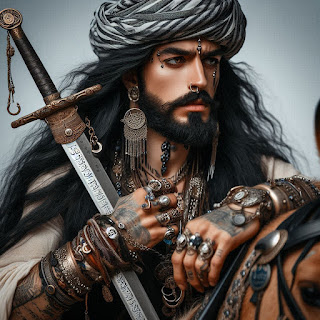Hannibal: The Legendary Carthaginian General
Hannibal Barca stands as one of the greatest military strategists in history. As the leader of Carthage’s forces during the Second Punic War (218–201 BCE), he masterminded audacious campaigns against the Roman Republic, including his legendary crossing of the Alps with war elephants. His tactics and battlefield genius continue to be studied and admired to this day.
Early Life and Rise to Power
Hannibal was born in 247 BCE in Carthage (modern-day Tunisia), the son of the respected Carthaginian general Hamilcar Barca. Hamilcar instilled a deep-seated hatred of Rome in his son, reportedly making him swear an oath to never befriend the Romans. This animosity drove Hannibal’s military career and fueled his determination to challenge Rome’s supremacy.
Following his father’s death, Hannibal’s brother-in-law, Hasdrubal the Fair, took command of Carthaginian forces in Spain. Upon Hasdrubal’s assassination in 221 BCE, Hannibal, then in his mid-20s, assumed command. Over the next two years, he strengthened Carthaginian control over the Iberian Peninsula, laying the groundwork for his daring campaign against Rome.
The Outbreak of the Second Punic War
Tensions between Carthage and Rome reached a boiling point when Hannibal besieged and captured Saguntum, a city allied with Rome, in 219 BCE. Rome declared war in response, triggering the Second Punic War. Rather than wait for the Romans to attack, Hannibal took the initiative, planning an audacious invasion of Italy by crossing the Alps.
The Legendary Alpine Crossing
Hannibal’s decision to march his army, including war elephants, over the Alps remains one of the most extraordinary feats in military history. His force, initially numbering around 90,000 infantry, 12,000 cavalry, and 37 elephants, endured treacherous terrain, harsh weather, and attacks from hostile tribes. By the time they emerged into northern Italy, Hannibal had lost nearly half of his army, but those who survived were battle-hardened and ready to face the Romans.
Hannibal’s Stunning Victories in Italy
Once in Italy, Hannibal delivered a series of crushing defeats to the Romans. His tactical brilliance was on full display in battles such as:
The Battle of Trebia (218 BCE): Hannibal lured the Romans into an ambush, destroying a significant portion of their army.
The Battle of Lake Trasimene (217 BCE): He orchestrated a surprise attack in a narrow pass, annihilating a Roman force and killing their commander, Gaius Flaminius.
The Battle of Cannae (216 BCE): His masterpiece, where he encircled and annihilated a vastly superior Roman army, inflicting one of the worst defeats in Roman history.
These victories left Rome on the brink of collapse, but Hannibal lacked the necessary reinforcements from Carthage to deliver a final, decisive blow.
The Turning Point: Rome’s Resurgence
Despite Hannibal’s dominance, the Romans adapted under the leadership of Fabius Maximus, who employed a strategy of attrition, avoiding direct battles while harassing Hannibal’s forces. Meanwhile, Roman general Publius Cornelius Scipio (later Scipio Africanus) took the fight to Spain, cutting off Carthage’s resources and forcing Hannibal’s recall to defend his homeland.
The Battle of Zama and Defeat
In 202 BCE, Hannibal faced Scipio Africanus at the Battle of Zama in North Africa. This time, the Romans, with superior cavalry and battlefield discipline, decisively defeated Hannibal’s forces. Carthage sued for peace, ending the Second Punic War. Hannibal’s long and remarkable struggle against Rome had come to an end.
Later Life and Legacy
After the war, Hannibal served as a statesman in Carthage, implementing financial reforms to pay Rome’s war indemnities. However, Rome, still wary of his influence, pressured Carthage to exile him. Hannibal fled to the courts of various Eastern rulers, offering his military expertise. Eventually, pursued by Roman agents, he took his own life in 183 BCE to avoid capture.
Hannibal’s legacy endures as one of history’s greatest military commanders. His tactics and strategies influenced countless generals, from Napoleon to modern military leaders. His audacity, resilience, and genius ensure that his name remains immortal in the annals of warfare.



Comments
Post a Comment